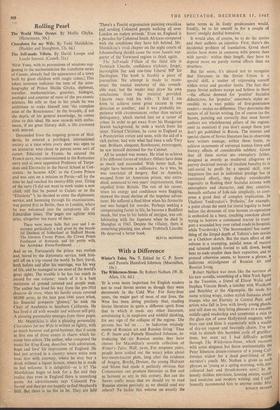With a Difference
'IT is even more important for English readers not to read Soviet stories as though they were documents in the Cold War. For forty-four years, the major part of most of our lives, the West has been doing precisely that, reading Soviet literature in quite a different spirit from that in which it reads any other literature, scrutinising it, in suspicion and wishful thinking, for any sign of the collapse of the regime. The process has led us . . . to ludicrous misjudg- ments of Russian art and Russian living.' Thus C. P. Snow and Pamela Hansford Johnson, in- troducing the six Russian stories they have chosen for Macmillan's seventh collection of Winter's Tales. Well, ye-es. For umpteen years, people have trotted out the weary jokes about boy-meets-tractor plots, long after the evidence of Aragon, Brecht,. Dreiser, the young Malraux and Silone had made it perfectly obvious that Communism can produce literature as fine and as humane as any in this century. But can the Snows really mean that we should try to read Russian stories precisely as we should read any others? To tackle this volume on exactly the
same terms as its lively predecessors would, frankly, be to let oneself in for a couple of hours' stodgily dutiful boredom: .
It would also, of course, be to do the stories and their authors an injustice. First, there's the incidental problem of translation. Good short stories have more in common with poems than with novels: within their length, they have to depend more on purely verbal effects than on structure.
But far more, it's absurd not to recognise that literature in the Soviet Union is a special skill, a matter of expressing oneself within strict and peculiar limits. The fact that many Soviet authors accept and believe in them. —the official demand for `positive' Socialist didacticism, for 'popular,' unesoteric styles ac- cessible to a vast public of first-generation readers—makes no difference. They determine the nature of all Soviet writing, for of course (as the Snows, pointing out correctly that most Soviet authors are wholehearted pillars of the regime, omit to mention) if you don't accept them you don't get published in Russia. The interest and special charm of Soviet literature lies in observing how writers manage, within these limits, to achieve statements of universal human force and literary effects of considerable subtlety. Given that all these stories are exemplary fables, designed as overtly as medimval allegories to purvey doctrinal morals of resolute banality (it is anti-social to profit by a special skill, true happiness lies not in individual prestige but in communal effort), they display considerable ingenuity in fleshing their Socialist axioms with atmosphere and character, and they contrive, beneath surfaces of folk-tale simplicity, to com- press a good deal of complex implication. In Vladimir Tendryakov's 'Potholes,' for example, a point about the need for literal legality to bend before the demands of true human co-operation is embodied in a busy, touching anecdote about trying to borrow a communal tractor to trans- port a wounded boy over rutted roads to hospital; while Tvardovsky's 'The Stovemakers' has some- thing of the limpid depth of Tolstoy's late stories or a Chekhov sketch. But the main effect of the volume is a cramping, painful sense of mature and talented minds forced to talk down, being bent to ends smaller than their capacities, and to pretend otherwise seems, to borrow a phrase, a ludicrous misjudgment of Russian art and Russian living. Robert Nathan was once, like the narrator of his new novella, something of a New York figure in the Twenties, a friend of Elinor Wylie and Stephen Vincent Benet, a luncher with Woollcott and Benchley at the Algonquin. He made his name writing wispy, rather stylish fantasies about tramps who see Eternity in Central Park and artists who fall in love with lovely young ghosts, and still does so; they bring pleasure to a sizeablo middle-aged readership and sometimes a mist to the glass eye of some Hollywood magnate, who buys one and films it expensively with a wealth of dry-ice vapour and heavenly choirs. I've no wish to disturb this harmless cycle of gratifica- tions, but must say I had difficulty getting through The Wilderness-Stone, which recounts with some elegance but fierce sentimentality the Peter lbbetson dream-romance of a young Cali- fornian widow for a dead poet-friend of the narrator's youth. Mr. Nathan is given to such phrases as 'young as a spring morning, with elm coloured hair and thrush-brown eyes'; he in- tensely dislikes television, housing estates, social- ised medicine and modern writing; and I can honestly recommend him to anyone under fifty.
RONALD BRYDEPI


































 Previous page
Previous page